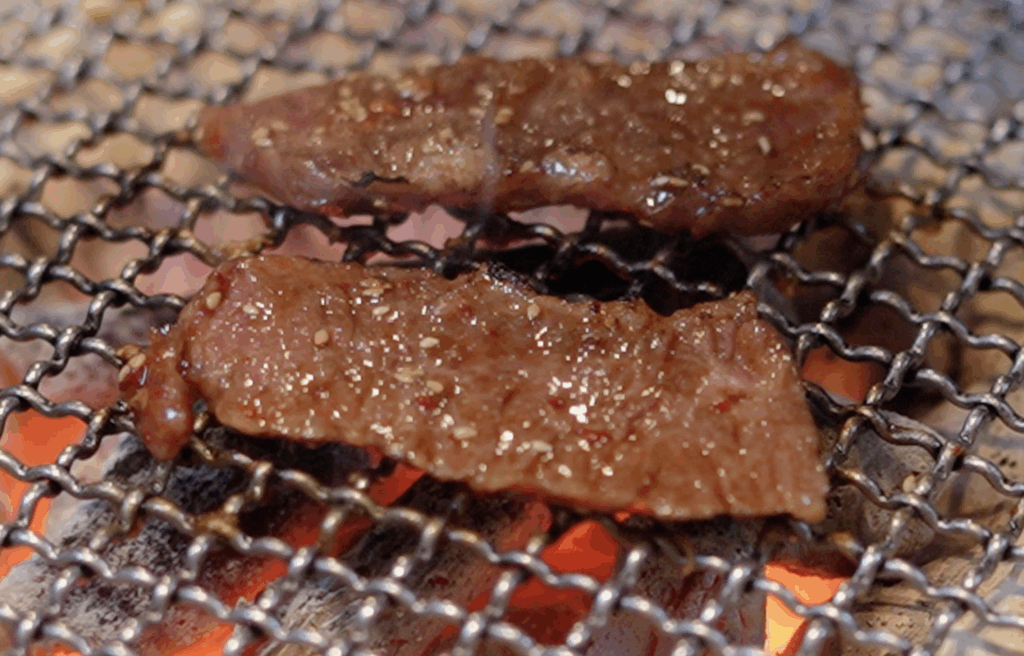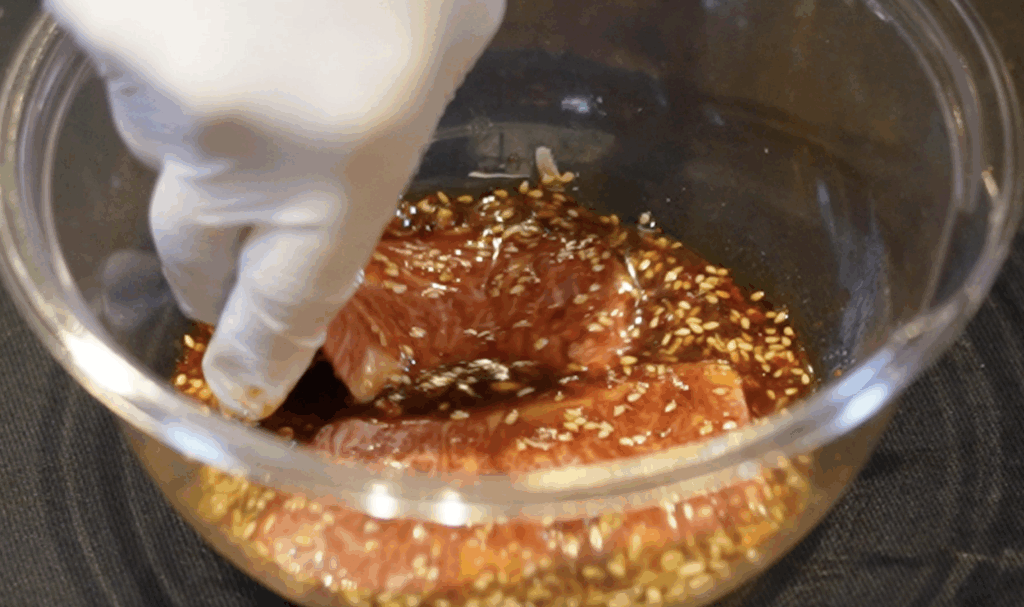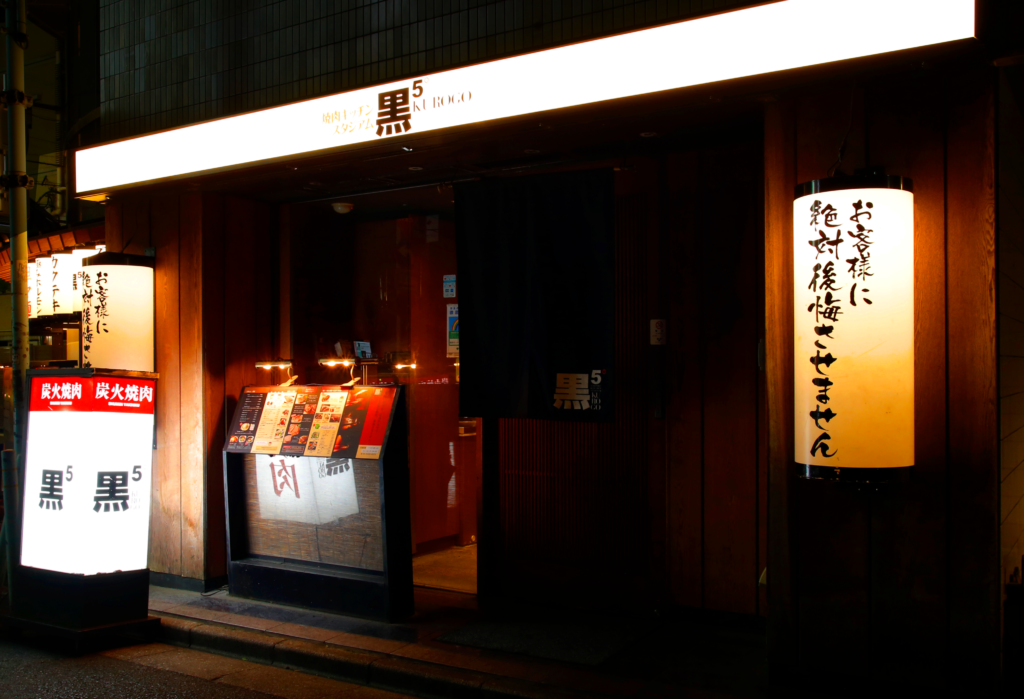The Myth of “Marinate to Make It Tender”

Many people believe that marinating meat overnight makes it softer and more flavorful. It sounds right, but scientifically, it’s not entirely true. The tenderness of meat depends on its muscle fibers and moisture retention. The sauce components affect both in very different ways.
Salt Can Actually Tighten the Meat
Most yakiniku sauces contain a significant amount of salt. Salt causes proteins to denature and release moisture. As a result, long marination can actually tighten the meat and make it tougher.

However, with lower salt concentration and shorter marination time, the sauce enhances surface flavor and aroma. The key lies in balancing time and intensity.
Sugar and Fruit Enzymes Help Tenderize
On the other hand, sugar and fruit juice work in the opposite direction. Sugar locks in moisture, while enzymes in fruits like kiwi or pineapple break down muscle fibers.

But again, too much can ruin the texture. Excessive enzyme action turns meat mushy. In professional kitchens, enzyme-rich ingredients are used in small amounts and for a very short time.
The Real Purpose of Seasoning Is Not to Soak In Flavor

In yakiniku, seasoning isn’t meant to soak flavor deep into the meat. Instead, it creates a flavorful layer on the surface, enhancing aroma and glaze when grilled. Therefore, it’s best to apply sauce right before grilling rather than marinating for hours. Especially for marbled cuts, minimal sauce use highlights the natural sweetness of fat.
Different Cuts Require Different Sauce Timing

Lean cuts like harami (skirt steak) and loin pair well with sauce applied during grilling. Fatty cuts such as kalbi or rib loin, however, tend to burn when marinated in sauce. For those, a post-grill dip works best. Professional chefs adjust sauce timing depending on the meat’s texture and fat content.
Tips for Perfect Home Marination
- Limit marination to 20 minutes to prevent salt tightening
- Use fruit-based sauces for 10 minutes or less to avoid over-tenderizing
- Re-coat right before grilling to enhance aroma and shine
With this balance, your home yakiniku will taste much closer to a professional finish.
Flavor Comes More from Grilling Than Marination
The ultimate flavor of yakiniku comes not from the sauce, but from the grilling technique. Even the same cut can taste completely different depending on how it’s cooked. Sauce is the supporting actor — the real star is always the meat itself.
Kuro5’s Approach

Seasoning in yakiniku is a delicate balance of science and technique. A great example is Kuro5, a yakiniku restaurant with locations in Ikebukuro and Kabukicho, Tokyo. Kuro5 is known for serving rare wagyu cuts at reasonable prices and for its signature “Yaki-Bugyo” style — where staff grill the meat on high-temperature charcoal to perfection right at your table.
At Kuro5, the marination process is intentionally kept short. Sauces are brushed onto the surface of the meat only moments before grilling, ensuring caramelization without burning. Each cut is matched with a specific sauce — a rich soy-based one for harami, and a light fruit-based one for lean meat. This “minimal marination” philosophy is what gives Kuro5’s yakiniku its pure, balanced flavor.

Wagyu Yakiniku Kuro5
IKEBUKURO Main Restrant
1F Shima 100 building ,2-46-3, Ikebukuro, Toshima-ku , Tokyo 171-0014
https://en.kuro5.net/restaurant/honten
Wagyu Yakiniku Kuro5
IKEBUKURO East Exit Restrant
2F Need Building, 1-42-16 Higashi-Ikebukuro, Toshima-ku, Tokyo 170-0013
https://en.kuro5.net/restaurant/higashiguchi
Wagyu Yakiniku KURO5
Kabukicho
1F Sankei Building, 2-21-4 Kabukicho, Shinjuku-ku, Tokyo
https://en.kuro5.net/restaurant/kabukicho
Official Instagram: @kuro5yakiniku





